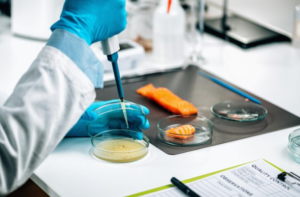Food Testing Laboratory in Chennai
Ensuring Food Safety: The Role of Food Testing Laboratory in Chennai
In the bustling city of Chennai, food safety is a paramount concern for both consumers and businesses. Ensuring that the food we consume is free from contaminants and meets regulatory standards is critical for public health. This is where food testing laboratories play an essential role. Here’s an in-depth look at the importance, processes, and benefits of food testing laboratory in Chennai.
The Importance of Food Testing

Food contamination can lead to severe health issues, including foodborne illnesses, allergic reactions, and long-term health complications. In Chennai, with its diverse food industry ranging from street vendors to large-scale manufacturers, ensuring food safety is a complex but crucial task. Food testing laboratory in chennai provide a scientific basis for evaluating the safety, quality, and nutritional value of food products, helping to protect consumers and maintain industry standards.
Key Areas of Food Testing
Food testing laboratory in Chennai conduct a variety of tests to ensure comprehensive food safety:
- Microbiological Testing: Identifies harmful microorganisms such as bacteria, viruses, and fungi that can cause foodborne diseases. Common pathogens tested include Salmonella, E. coli, and Listeria.
- Chemical Testing: Detects chemical contaminants like pesticides, heavy metals, additives, and preservatives. This testing ensures that chemical residues are within safe limits..
- Nutritional Analysis: Evaluates the nutritional content of food products, including vitamins, minerals, fats, proteins, and carbohydrates. This helps verify labeling claims and ensures compliance with nutritional standards..
- Allergen Testing: Identifies potential allergens such as peanuts, gluten, and dairy, ensuring that products are safe for individuals with food allergies..
- Shelf-life Testing: Assesses the longevity and safety of food products over time, ensuring they remain safe and of good quality until their expiration date.
The Process of Food Testing
The process of food testing laboratory in Chennai involves several key steps:
- Sample Collection: Samples are collected from various sources, including raw materials, finished products, and food processing environments.
- Laboratory Analysis: Using advanced technology and equipment, laboratories conduct detailed analyses to detect contaminants and evaluate the overall quality of the food.
- Report Generation: Detailed reports are prepared, highlighting the findings and any deviations from regulatory standards.
- Recommendations: Based on the results, laboratories provide recommendations for corrective actions to ensure compliance and improve food safety practices.
Regulatory Compliance
Food testing laboratory in Chennai help businesses comply with national and international food safety regulations. Authorities like the Food Safety and Standards Authority of India (FSSAI) set stringent guidelines for food safety. Regular testing ensures that food products meet these standards, helping businesses avoid legal issues and maintain consumer trust.
The Role of Accredited Laboratories
Accredited food testing laboratory in Chennai are vital for maintaining high testing standards. Accreditation ensures that laboratories adhere to strict quality control measures, providing reliable and accurate results. These laboratories employ skilled professionals and use advanced technology to deliver comprehensive testing services.
Food testing laboratory in Chennai are crucial for ensuring the safety, quality, and compliance of food products. By conducting rigorous tests and analyses, these laboratories help protect public health and support the food industry in maintaining high standards. Regular food testing is essential for preventing contamination, ensuring nutritional accuracy, and safeguarding consumer trust. As Chennai continues to grow and evolve, the role of food testing laboratory remains indispensable in promoting food safety and public health.


